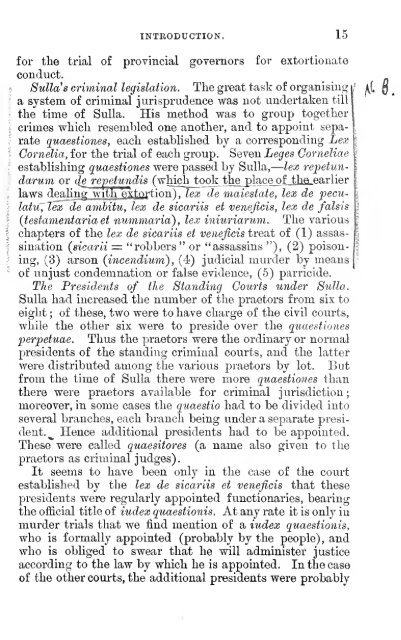Pro S. Roscio Amerino
Pro S. Roscio Amerino
Pro S. Roscio Amerino
You also want an ePaper? Increase the reach of your titles
YUMPU automatically turns print PDFs into web optimized ePapers that Google loves.
INTRODUCTION. 15<br />
for tlie trial of provincial governors for extortionate<br />
conduct.<br />
Sullas criminal legislation. The great task of organising d<br />
a system of criminal jurisprudence was not undertaken tillj<br />
.:<br />
] the time of Sulla. His method was to group together|<br />
\ crimes which resembled one another, and to appoint sepa-<br />
rate j quaestiones, each established by a corresponding Lex<br />
\ Cornelia, for the trial of each group. Seven Leges Gorneliae<br />
I establishing quaestiones were passed by Sulla, lex repetundarum<br />
or cje revetundis (wliich_jtqok the j3laceof_tlie_earlier<br />
I<br />
laws dealiiig with exf/qytion^. lex de maiestate, lex de pecu-<br />
latiC^Tex de amhitu, lex de sicariis et veneficis, lex de falsis<br />
I<br />
(testamentariaet mimmaria),lex iniuriarum. The various<br />
I<br />
chapters of the lex de sicariis et veneficis treat of (1) assas-<br />
I<br />
I sination {sicarii = "robbers" or "assassins "), (2) poisonjudicial<br />
murder by means<br />
?! ing, (3) arson (incendium), (4)<br />
^ of unjust condemnation or false evidence, (5) parricide.<br />
The Presidents of tlie Standing Courts under SuUa.<br />
Sulla had increased the number of the praetors from six to<br />
eiglit ; of these, two were to have charge of the civil courts,<br />
while the other six were to preside over the quaestiones<br />
perpettiae. Thus the praetors were the ordinary or normal<br />
presidents of the standing criminal courts, and the latter<br />
were distributed among the various praetors by lot. But<br />
from the time of Sulla there were more quaestiones than<br />
there were praetors available for criminal jurisdiction<br />
moreover, in some cases the quaestio had to be divided into<br />
several branches, each branch being under a separate president.^<br />
Hence additional presidents had to be appoiuted.<br />
These were called quaesitores (a name also given to the<br />
praetors as criminal judges).<br />
It seems to have been only in the case of the court<br />
established by the lex de sicariis et veneficis that these<br />
presidents were regularly appointed functionaries, bearing<br />
the official title of iudex quaestionis. At any rate it is only in<br />
murder trials that we find mention of a iudex quaestionis,<br />
who is formally appointed (probably by the people), and<br />
who is obhged to swear that he will administer justice<br />
according to the law by which he is appointed. In the case<br />
of the other courts, the additional presidents were probably

















